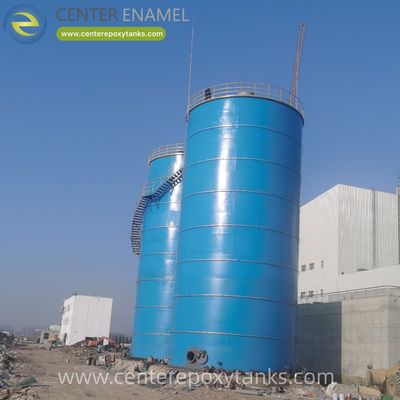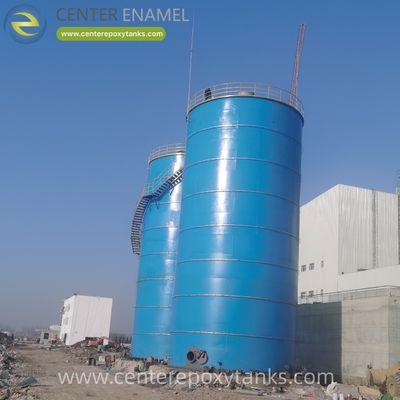-
Çelik Tanklara Dökülen Cam (419)
-
Paslanmaz Çelik Tanklar (410)
-
Füzyon Bağlı Epoksi Tankları (424)
-
Galvanizli Çelik Tanklar (321)
-
Alüminyum Kubbe Çatı (872)
-
Atık su depolama tankları (226)
-
kaynaklı çelik tanklar (297)
-
Basınçlı kaplar (295)
-
Anaerobik Çürütücü (201)
-
Endüstriyel Su Tankları (349)
-
cam kaplı çelik tanklar (180)
-
Boltlu Çelik Tanklar (181)
-
Çamur Depolama Tankı (115)
-
Biyogaz Depolama Tankı (173)
-
Sıvı depolama tankları (133)
-
Tarımsal Su Depolama Tankları (179)
-
Yangın Su Tankı (166)
-
Tahıl Depolama Silosları (130)
-
Biyogaz Projeleri (349)
-
Atık su arıtma projeleri (270)
-
Çift Membranlı Çatı (223)
Yüzer Tavanlı Yağ Tankları için Karbon Çelik Tank: Uçucu sıvıların muhafazası için güçlü, temel bir kabuk yapısı sağlar
| Menşe yeri: | Çin |
| Marka adı: | CEC TANKS |
| Sertifika: | ISO 9001:2008, AWWA D103 , OSHA , BSCI |
| Model numarası: | K |
| Min sipariş miktarı: | 1 takım |
| Fiyat: | $5000~$20000 one set |
| Ambalaj bilgileri: | Her iki çelik plaka arasında PE poli-köpük; ahşap palet ve ahşap |
| Teslim süresi: | Depozito alındıktan sonra 10-30 gün |
| Ödeme koşulları: | L/C, T/T |
| Yetenek temini: | Ayda 60 takım |
|
Detay Bilgi |
|||
| Menşe yeri | Çin | Marka adı | CEC TANKS |
|---|---|---|---|
| Sertifika | ISO 9001:2008, AWWA D103 , OSHA , BSCI | Model numarası | K |
| Korozyon direnci: | Atık su, tuzlu su, deniz suyu, yüksek kükürtlü ham petrol, tuz tilkisi, organik ve inorganik bileşik | Elastik: | Çelik sac ile aynı |
| Tank gövde rengi: | özelleştirilmiş Tasarım | Kaplama kalınlığı: | Özelleştirilmiş |
| Temel: | Beton | Çelik kalitesi: | Paslanmaz çelik |
| Vurgulamak: | karbon çelik yüzer tavanlı yağ tankı,uçucu sıvılar için kaynaklı çelik tank,yüzer tavanlı tank kabuk yapısı |
||
Ürün Tanımı
Yüzer Tavanlı Yağ Tankları için Karbon Çelik Tank: Uçucu sıvıların tutulması için güçlü, temel bir kabuk yapısı sağlar
Yüzer Tavanlı Yağ Tankları(FROT'lar), büyük ölçekli atıkların muhafazası için özel olarak inşa edilmiş, özel ve temel bir depolama gemisi kategorisini temsil eder.uçucu sıvılarHam petrol ve benzin gibi. Ayırt edici özelliği (doğrudan sıvı yüzeyinde yüzen bir çatı) yalnızca buhar alanını en aza indirmek, böylece buharlaşma kayıplarını büyük ölçüde azaltmak ve patlayıcı buhar birikmesi riskini sınırlamak için uygulanmıştır.Karbon Çelik Tankolarak hizmet vermektedirgüçlü, temel kabuk yapısıÜrünü içeren ve yüzer tavanın hareketini yönlendiren kısımdır. Bu kabuğun yapısal bütünlüğü, boyutsal kararlılığı ve hassas üretimi, tüm sistemin etkinliği ve güvenliği açısından çok önemlidir.
Shijiazhuang Zhengzhong Technology Co, Ltdolarak küresel çapta faaliyet gösterenOrta Emaye, üstün endüstriyel muhafaza çözümleri sağlamada uzmanlaşmıştır. İmalat konusundaki uzmanlığımızKarbon Çelik Tanklarözel uygulamalar için bizi kesin tedarikçi olarak konumlandırıyortemel kabuk yapısıiçinYüzer Tavanlı Yağ Tankları. Bu uygulamanın, iç ve dış çatı yalıtım malzemelerinin düzgün çalışması için kritik önem taşıyan en yüksek derecede yapısal bütünlük ve boyutsal doğruluk gerektirdiğini biliyoruz. Tanklarımız, karbon çeliğinin benzersiz gücünden ve güvenilirliğinden yararlanarak, bu faktörlere tavizsiz bir şekilde odaklanılarak tasarlanmış, API 650'nin katı standartlarına göre tasarlanmış ve üretilmiştir. Center Enamel, hassas üretim teknikleri ve sıkı kalite kontrolü kullanarak, yalnızca sağlam ve dayanıklı olmakla kalmayıp aynı zamanda da bir muhafaza çözümü sunar.güvenliama aynı zamanda oldukça yüksek bir seviyeyi temsil ediyoruygun maliyetlive çevresel emisyonların en aza indirilmesi ve ürün geri kazanımının en üst düzeye çıkarılması için kalıcı yatırım. Mühendislik mükemmelliğine olan bu bağlılık, müşterilerimizin uçucu sıvılarının güvenli, uyumlu ve güvenilir bir şekilde muhafaza edildiğini bilerek güvenle çalışabilmelerini sağlar.
Ürün Avantajları ve Özellikleri: Yapısal Hassasiyet, Bütünlük ve Buhar Kontrol Desteği
AKarbon Çelik Tankherkes için gerekli temeli sağlarYüzer Tavanlı Yağ Tankları(ister Dahili Yüzer Tavan - IFR, ister Harici Yüzer Tavan - EFR), yapısal hassasiyet, yüksek bütünlük ve karmaşık buhar kontrol sistemleriyle kusursuz entegrasyonun üstün bir kombinasyonunu sunar.
Tavizsiz Yapısal Bütünlük:Yüzer tavanlı tanklar genellikle rafineriler ve terminallerdeki devasa yapılardır. Karbon çeliği, gerekli yüksek çekme mukavemetini sağlayarak devasa hidrostatik basınçlara güvenilir bir şekilde dayanabilen yapısal olarak sağlam bir kap oluşturur. Bu doğuştanyapısal bütünlükOperasyonel güvenliğin sağlanması ve uzun vadeli olması açısından son derece önemlidirgüvenilirlik.
Temel Boyutsal Hassasiyet:Yüzer tavanın etkinliği tamamen tavan ile tank kabuğu arasındaki contaya bağlıdır. Karbon çeliği imalatı şunları sağlar:temel kabuk yapısıAşağıdakileri sağlamak için gerekli katı boyut toleransları ile inşa edilecektir:
Etkili Sızdırmazlık:Çatı yukarı ve aşağı hareket ederken birincil ve ikincil contaların kabuk duvarı ile sürekli temas halinde olmasını sağlar.
Pürüzsüz Çatı Hareketi:Sürtünmeyi en aza indirerek ve yapışmayı önleyerek çatının daima sıvı yüzeyinde yüzmesini sağlar.
Büyük Ölçekli Volatilite Kontrolünde Maliyet Etkinliği:Yüzer tavanın kendisi karmaşıklığı artırırken, ana kabuk için karbon çeliğinin kullanılması en ekonomik güç-maliyet oranını sağlar. Bu, FROT tasarımını en çok yaparmali açıdan sağlambüyük ölçekli yöntem,Uçucu sıvıların uygun maliyetli muhafazasıve emisyonların kontrolü.
Uçucu Hidrokarbonlarla Uyumluluk:Karbon çeliği, depolanan tüm uçucu ürünlerle (ham petrol, benzin, nafta) mükemmel bir genel uyumluluk sergiler. Sağlam yapısı aynı zamanda ek korozyon önleyici koruma için belirtildiğinde iç kaplamalar veya astarlar için gerekli desteği de sağlar.
Güvenlik ve İzlemenin Entegrasyonu:Güçlü karbon çeliği kabuk aşağıdakilerin güvenli entegrasyonu için tasarlanmıştır:
Jant Yangın Söndürme:EFR tankları için zorunlu olan çevre köpüklü veya kuru kimyasallı yangın söndürme sistemleri için güvenli bağlantılar.
Çatı Süzgeçleri ve Havalandırmalar:Yağmur suyunu dış çatıdan yönlendirmek ve acil durum havalandırma delikleri kurmak için güvenli ve uyumlu nozullar.
Ürün Uygulamaları
Yüzer Tavanlı Yağ Tankları için Karbon Çelik Kabuk YapısıMinimum ürün kaybı ve sıkı emisyon kontrolü ile büyük miktarda uçucu petrol ürününün güvenli bir şekilde depolanması gereken her yerde kullanılır.
Ham Petrol Depolama Terminalleri:Daha hafif bileşenlerin (hafif uçlar) buharlaşmasını azaltmak için yüzer çatılar kullanılarak büyük miktarlarda ham petrol tutmak için küresel olarak kullanılır.
Benzin ve Nafta Depolama:Rafinerilerde ve dağıtım terminallerinde yüksek oranda uçucu yakıtların bulundurulması ve buhar emisyonlarının yasal sınırların altında tutulmasını sağlamak için gereklidir.
Petrokimya Hammadde Depolama:Hacmi korumanın ve çevreye salınımı en aza indirmenin kritik olduğu uçucu petrokimyasal sıvıların ve ara rafineri ürünlerinin depolanması için kullanılır.
Rafineri Ara Depolama:Çeşitli uçucu ara rafineri akışları için kullanılır ve güvenlik için buhar basıncı yönetiminin gerekli olduğu işleme ünitelerinde önemli bir tampon görevi görür.
Toplu Liman Tesisleri:Uçucu petrol ürünlerinin tankerlerden yüklenmesi ve boşaltılması için deniz limanlarında kritik altyapı, güvenli transfer ve operasyon sırasında minimum kayıp sağlanması.
Şirketin Avantajları: Mükemmel Mühendislik ve Hassas Üretim Mirası
Center Enamel'in seçkin duruşuPremium Karbon Çelik Tank TedarikçisiFROT kabuk yapıları için bu ürün, gelişmiş mühendisliğimizin, titiz üretim süreçlerimizin ve değişmez kalite güvencemizin bir sonucudur ve yapısal hassasiyete odaklanmış üstün bir ürünün teslimini sağlar.
Bizimuzman mühendislik ekibiİlgili tüm uluslararası standartlara, özellikle de yüzer tavanlara ev sahipliği yapacak tank kabuklarına yönelik zorlu API 650 kodu gerekliliklerine sıkı sıkıya uyan tank kabuklarının tasarlanması ve modellenmesinde uzmanlaşmıştır. Her FROT projesi, mühendislerimizin boyutsal tolerans gerekliliklerini, rüzgar yüklerini ve sismik riski analiz ettiği titiz bir planlama aşamasıyla başlar. Sağlam inşaat, sahada inşa edilebilirlik ve uzun vadeli kullanım için optimize edilmiş özel bir plan oluşturmak için gelişmiş tasarım yazılımından ve onlarca yıllık saha deneyiminden yararlanıyoruz.güvenilirlik. Tasarımlarımız ön plandayapısal sağlamlıkve çatı contaları için gerekli olan kabuğun hassas dikeyliği ve yuvarlaklığı.
Bizim son teknoloji ürünüimalat tesisleritutarlı, yüksek kaliteli karbon çeliği bileşenler üretmek için yüksek hassasiyetli üretim süreçleriyle donatılmıştır. Kritik altyapımızın bütünlüğünü ve uzun ömürlülüğünü garanti altına almak için yalnızca tam malzeme izlenebilirliğine sahip, sertifikalı, yüksek kaliteli karbon çeliği kullanıyoruz. Tüm üretim süreçleri, en yüksek güvenlik ve kalite standartlarını sağlamak için titizlikle kontrol edilir ve izlenir.
Bizim titizKalite Güvencesi (QA) ve Kalite Kontrol (QC)program kapsamlı ve kararlıdır. Gelen tüm materyallerin uyumluluk açısından titizlikle doğrulanması. Mutlak yapısal bütünlüğü sağlamak için kritik kabuk kaynaklarında Kapsamlı Tahribatsız Muayene (NDT) gerçekleştirilir. Etkili çatı yalıtımı işlemi için gereken duvar düzgünlüğünü ve yuvarlaklığını garanti etmek amacıyla kabuk plakası eğriliği ve montajına ilişkin boyutsal kontroller son derece hassas bir şekilde gerçekleştirilir. Bu titiz süreç, teslim edilen tankınuçucu sıvıların tutulması için güçlü, temel bir kabuk yapısı sağlar.
Çözüm
İçinYüzer Tavanlı Yağ Tankları,Karbon Çelik TankTüm sistemin performansını belirleyen temel yapıyı oluşturur. İdeal kombinasyonunu sunartavizsiz yapısal bütünlükve bunun için gerekli özel özelliklerboyutsal hassasiyetVebuhar kontrol desteği. Bu karbon çeliği kabuklar şunları sağlar:güvenilirVedayanıklıEn yüksek güvenlik, kalite ve çevre standartlarını karşılamak için enerji sektörü genelinde gerekli altyapıuygun maliyetlive yüksek hacimli ürünler için kanıtlanmış seçimuçucu sıvıların tutulması. Dünyanın en zorlu müşterileri için özel olarak tasarlanmış, sağlam çözümler sunma konusunda kanıtlanmış bir geçmişe sahip lider bir üretici olarak Center Enamel, onlarca yıl boyunca güvenli, dayanıklı ve yüksek verimliliğe sahip bir FROT depolama altyapısını güvence altına almak için ideal ortağınızdır.




